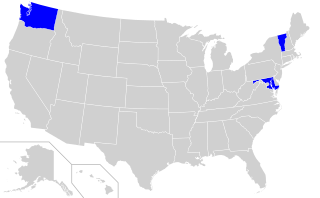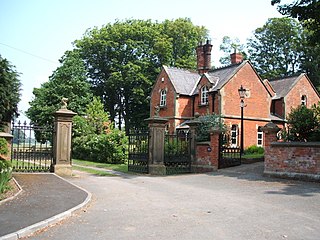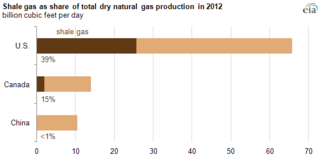
Balcombe is a village and civil parish in the Mid Sussex District of West Sussex, England. It lies 31 miles (50 km) south of London, 16 miles (26 km) north of Brighton, and 32 miles (51 km) east north east of the county town of Chichester. Nearby towns include Crawley to the north west and Haywards Heath to the south south east.
Tompa is a town in Bács-Kiskun county, Hungary.

Fracking in the United States began in 1949. According to the Department of Energy (DOE), by 2013 at least two million oil and gas wells in the US had been hydraulically fractured, and that of new wells being drilled, up to 95% are hydraulically fractured. The output from these wells makes up 43% of the oil production and 67% of the natural gas production in the United States. Environmental safety and health concerns about hydraulic fracturing emerged in the 1980s, and are still being debated at the state and federal levels.

Singleton is a village and civil parish in Lancashire, England. It is situated on the coastal plain called the Fylde. It is located south-east of Poulton-le-Fylde, and at the 2001 census had a population of 877, increasing to 889 at the 2011 Census. The parish is sometimes referred to as two parts – Great Singleton is the larger part containing the village, and Little Singleton is a small area north of the village bordering the River Wyre.

Shale gas is an unconventional natural gas that is found trapped within shale formations. Since the 1990s a combination of horizontal drilling and hydraulic fracturing has made large volumes of shale gas more economical to produce, and some analysts expect that shale gas will greatly expand worldwide energy supply.

Westby-with-Plumptons is a civil parish in Lancashire, England. The parish is in Fylde district and contains the hamlets of Great Plumpton, Little Plumpton, Lower Ballam, Higher Ballam, Moss Side, Peel, and Westby. At the 2011 census, the parish had a population of 1,205. Westby and Plumpton are mentioned in the Domesday Book, as "Westbi" and "Pluntun".

The inclusion of unconventional shale gas with conventional gas reserves has caused a sharp increase in estimated recoverable natural gas in Canada. Until the 1990s success of hydraulic fracturing in the Barnett Shales of north Texas, shale gas was classed as "unconventional reserves" and was considered too expensive to recover. There are a number of prospective shale gas deposits in various stages of exploration and exploitation across the country, from British Columbia to Nova Scotia.

Fracking is a well stimulation technique involving the fracturing of bedrock formations by a pressurized liquid. The process involves the high-pressure injection of "fracking fluid" into a wellbore to create cracks in the deep-rock formations through which natural gas, petroleum, and brine will flow more freely. When the hydraulic pressure is removed from the well, small grains of hydraulic fracturing proppants hold the fractures open.
Shale gas is an unconventional natural gas produced from shale, a type of sedimentary rock. Shale gas has become an increasingly important source of natural gas in the United States over the past decade, and interest has spread to potential gas shales in Canada, Europe, Asia, and Australia. One analyst expects shale gas to supply as much as half the natural gas production in North America by 2020.
Frack Off is a grassroots direct action campaign aimed at stopping the extraction of unconventional resources in the UK, specifically concentrating on unconventional gas extraction.

Fracking in the United Kingdom started in the late 1970s with fracturing of the conventional oil and gas fields near the North Sea. It was used in about 200 British onshore oil and gas wells from the early 1980s. The technique attracted attention after licences use were awarded for onshore shale gas exploration in 2008. The topic received considerable public debate on environmental grounds, with a 2019 high court ruling ultimately banning the process. The two remaining high-volume fracturing wells were supposed to be plugged and decommissioned in 2022.

Fracking has become a contentious environmental and health issue with Tunisia and France banning the practice and a de facto moratorium in place in Quebec (Canada), and some of the states of the US.

Environmental impact of fracking in the United States has been an issue of public concern, and includes the contamination of ground and surface water, methane emissions, air pollution, migration of gases and fracking chemicals and radionuclides to the surface, the potential mishandling of solid waste, drill cuttings, increased seismicity and associated effects on human and ecosystem health. Research has determined that human health is affected. A number of instances with groundwater contamination have been documented due to well casing failures and illegal disposal practices, including confirmation of chemical, physical, and psychosocial hazards such as pregnancy and birth outcomes, migraine headaches, chronic rhinosinusitis, severe fatigue, asthma exacerbations, and psychological stress. While opponents of water safety regulation claim fracking has never caused any drinking water contamination, adherence to regulation and safety procedures is required to avoid further negative impacts.

The environmental impact of fracking is related to land use and water consumption, air emissions, including methane emissions, brine and fracturing fluid leakage, water contamination, noise pollution, and health. Water and air pollution are the biggest risks to human health from fracking. Research has determined that fracking negatively affects human health and drives climate change.
Refracktion is a British group concerned with the environmental impact of hydraulic fracturing (fracking) for gas on the Fylde Coast of Lancashire, England. They believe fracking will have inevitable negative effects on the local environment and its amenity value.
The anti-fracking movement is a political movement that seeks to ban the practice of extracting natural gasses from shale rock formations to provide power due to its negative environmental impact. These effects include the contamination of drinking water, disruption of ecosystems, and adverse effects on human and animal health. Additionally, the practice of fracking increases the amount of carbon dioxide released into the atmosphere, escalating the process of climate change and global warming. An anti-fracking movement has emerged both internationally, with involvement of international environmental organizations, and nation states such as France and locally in affected areas such as Balcombe, Sussex, in the UK, Pungești in Romania, Žygaičiai in Lithuania, and In Salah in Algeria. Through the use of direct action, media, and lobbying, the Anti-Fracking movement is focused on holding the gas and oil industry accountable for past and potential environmental damage, extracting compensation from and taxation of the industry to mitigate impact, and regulation of gas development and drilling activity.
Shale gas in the United Kingdom has attracted increasing attention since 2007, when unconventional onshore shale gas production was proposed. The first shale gas well in England was drilled in 1875. As of 2013 a number of wells had been drilled, and favourable tax treatment had been offered to shale gas producers.

The Balcombe drilling protest occurred when test drilling and possible fracking for petroleum were proposed in 2012 near Balcombe, a village in West Sussex England. Local residents protested and anti-fracking environmentalists in the UK made it a focus of attention. The drill pad is located in a wooded area known as Lower Stumble Wood.

Fracking in Canada was first used in Alberta in 1953 to extract hydrocarbons from the giant Pembina oil field, the biggest conventional oil field in Alberta, which would have produced very little oil without fracturing. Since then, over 170,000 oil and gas wells have been fractured in Western Canada. Fracking is a process that stimulates natural gas or oil in wellbores to flow more easily by subjecting hydrocarbon reservoirs to pressure through the injection of fluids or gas at depth causing the rock to fracture or to widen existing cracks.

The Infrastructure Act 2015 is a wide-ranging piece of planning and infrastructure legislation passed by the Parliament of the United Kingdom during David Cameron's administration. The act targets "transport, energy provision, housing development and nationally significant infrastructure projects", and has been the subject of some degree of controversy.











